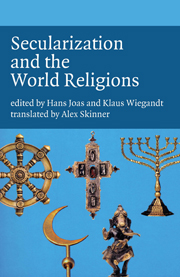Book contents
- Frontmatter
- Contents
- Notes on Contributors
- Foreword
- Society, State and Religion: Their Relationship from the Perspective of the World Religions: An Introduction
- 1 Catholic Christianity
- 2 Protestantism
- 3 The Departure and Return of God: Secularization and Theologization in Judaism
- 4 Islam and Secularization
- 5 Hinduism
- 6 Secularization: Confucianism and Buddhism
- 7 From Hostility through Recognition to Identification: State–Church Models and their Relationship to Freedom of Religion
- 8 ‘Science Doesn't Tremble’: The Secular Natural Sciences and the Modern Feeling for Life
- 9 The Religious Situation in Europe
- 10 The Religious Situation in the USA
- 11 The Religious Situation in East Asia
- 12 The Relevance of the European Model of Secularization in Latin America and Africa
- 13 The Desecularization of the Middle East Conflict: From a Conflict between States to a Conflict between Religious Communities
- Afterword
12 - The Relevance of the European Model of Secularization in Latin America and Africa
- Frontmatter
- Contents
- Notes on Contributors
- Foreword
- Society, State and Religion: Their Relationship from the Perspective of the World Religions: An Introduction
- 1 Catholic Christianity
- 2 Protestantism
- 3 The Departure and Return of God: Secularization and Theologization in Judaism
- 4 Islam and Secularization
- 5 Hinduism
- 6 Secularization: Confucianism and Buddhism
- 7 From Hostility through Recognition to Identification: State–Church Models and their Relationship to Freedom of Religion
- 8 ‘Science Doesn't Tremble’: The Secular Natural Sciences and the Modern Feeling for Life
- 9 The Religious Situation in Europe
- 10 The Religious Situation in the USA
- 11 The Religious Situation in East Asia
- 12 The Relevance of the European Model of Secularization in Latin America and Africa
- 13 The Desecularization of the Middle East Conflict: From a Conflict between States to a Conflict between Religious Communities
- Afterword
Summary
Secularization involves several dimensions, but refers in particular to the decreasing salience of any reference to the transcendent or to a realm beyond, above or interfusing with mundane reality. Any tension between the transcendent and the mundane is relaxed, or else taken over by the secular utopias of politics or by the myths of nationalism. This process has been seen in an enlightened perspective as the erosion of superstition by rationality or science and/or the liberation of humanity or the human as such from oppression and alienation. It has also been seen as inevitable, spreading out by degrees from its Western European heartland, with France at its epicentre, to encompass the whole world. France is frequently identified as the secularist country, whereas (say) Britain, Scandinavia, Holland and Germany are sources of mere secularity. There are serious differences here. Secularism is a doctrine promoting the secular, secularization is a process whereby a secular condition becomes progressively more dominant, and mere secularity is not so much a doctrine as a state of affairs in which the transcendent is irrelevant for most individuals and for the nation as a whole.
Secularization is more than the decline of church-going or even of Christianity. If one adopted a rigorous definition it would involve indifference to ‘the spirit’ and that, at least, seems not to be the case, even in Western Europe. In Germany church-going diminishes but spirituality in all its many forms appears to be on the rise.
- Type
- Chapter
- Information
- Secularization and the World Religions , pp. 278 - 295Publisher: Liverpool University PressPrint publication year: 2009



